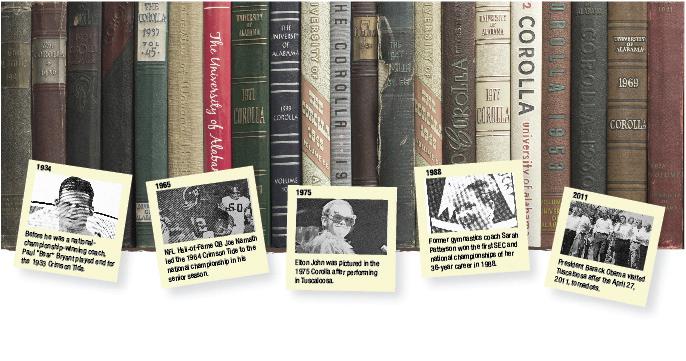After years of declining sales and financial losses, the Media Planning Board members – a collection of students, faculty and media professionals – voted unanimously to cease publication.
“As the CW joins the rest of print media in declining ad sales, board members felt that we could not justify taking more money that the CW needs and putting into a yearbook that UA students didn’t seem to want,” said Chris Roberts, an associate professor of journalism and chairman of the Media Planning Board. “We hate it, but we had no choice.”
Sales began declining more than a decade ago, so The Corolla switched to paperback in 2012 in an effort to lower its price.
The Corolla lost $227,000 between 2007 and 2014, including $23,686 so far this year.
“The 2013-14 yearbook sold 24 copies,” said Paul Wright, the director of UA Student Media. “I hate to kill something that old that’s a tradition of this institution, but it’s obvious to me that we’re fighting a losing cause.”
University officials turned down three requests by Student Media over the past few years to support a student-controlled yearbook. Proposals included a plan similar to Auburn University’s approach that gives each student a yearbook paid by student fees, and a proposal to give only seniors a Corolla.
“We have tried everything that I can think of to try to get it funded by another means,” Wright said.
Alabama, along with Virginia, Mississippi State, and the University of South Carolina, is among a growing list of universities to close its yearbook because of the onset of students moving to online media and instant information.
“We’ve held on longer than most have,” Wright said.
Students rarely saw themselves in The Corolla, which could be a reason for its decline in sales.
“Everybody wanted one in high school, because it was a shared experience,” said Alvin Lockett, a board member representing UA’s Black Student Union. “Everybody felt involved. You voted for king and queen. We do that here, but you don’t feel involved.”
Student member of the board Madison Hooper said she saw lots of dusty Corollas in the corner of art classrooms, and asked students whether they bought it.
“They said to me, ‘I’m not in it,’” said Hooper, who represented the Academic Honor Council on the Media Planning Board.
Roberts said a high school yearbook provides an immediate gratification for students that a college yearbook does not.
“Most high school students buy a book to see themselves the minute they pick it up, and only it gains in value 30 years later,” Roberts said. “A college book doesn’t have much front-end value to students because college students don’t have much shared experience while they are in school, and only over the decades do alumni perceive that shared experience as simply being in Tuscaloosa at the same time.”
Wright said Student Media looked into other formats for the book, but students in focus groups were not impressed.
“Students didn’t seem to want it in a digital format,” Wright said, “and 20 years down the road you may not be able to convert it to another format.”
In a separate decision, the board unanimously approved plans for a new magazine to be targeted to and edited by University women.
The new publication will be digital – the opposite of The Corolla, which captured the history of generations of University life since 1892 as a hardback book.
Mark Mayfield, a longtime magazine editor and now associate director of Student Media, said students he’s talked to love the idea.
“Women students tend to read magazines at much higher rates than male students,” Mayfield said. “They’re into fashion and beauty and food and travel and all sorts of things. Even though the CW has a section called ‘Culture,’ we’re not reaching that market well enough.”









